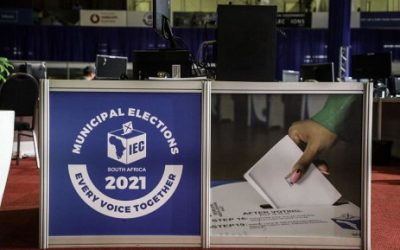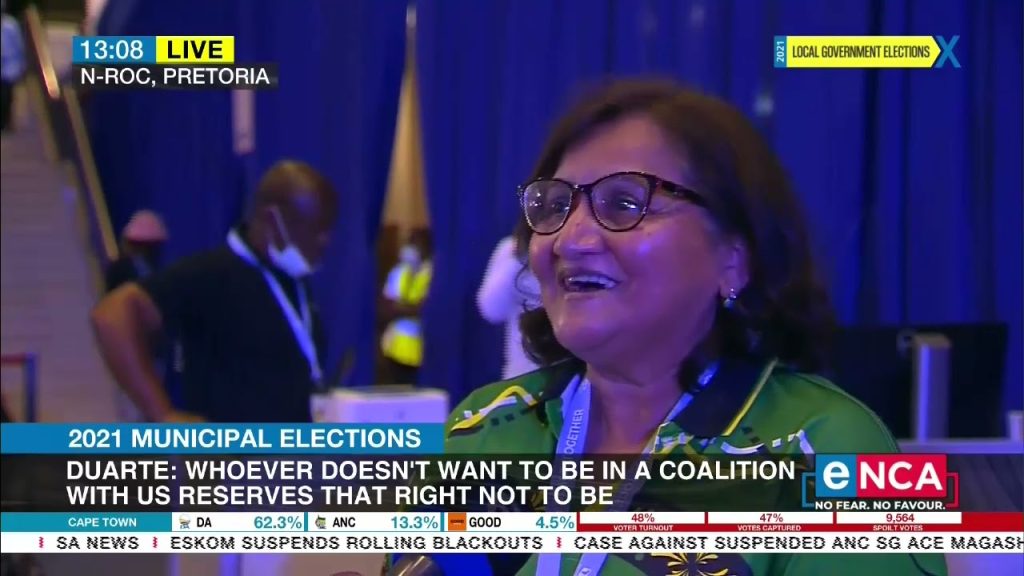South African Local Government Elections Held Amid Numerous Crises
Ruling African National Congress wins 46% of the votes while the opposition Democratic Alliance loses control of several municipalities in their Western Cape stronghold

All Global Research articles can be read in 51 languages by activating the “Translate Website” drop down menu on the top banner of our home page (Desktop version).
To receive Global Research’s Daily Newsletter (selected articles), click here.
Visit and follow us on Instagram at @crg_globalresearch.
***
With a COVID-19 pandemic causing enormous public health issues in the Republic of South Africa, local governmental elections were held on November 1 where millions of registered voters participated.
The results indicate that the ruling African National Congress (ANC), the party which led the struggle for national liberation from the apartheid colonial system, has witnessed another erosion of electoral support.
The ANC garnered less than 50% of the votes yet far outperformed the leading opposition party, the Democratic Alliance, by gaining more than twice as many votes. The ANC secured 46.03% while the DA won 21.84%.
In actual numbers, the ANC votes totaled 10.6 million while the DA scored approximately 5.1 million. The third ranking party behind the ANC and DA was the Economic Freedom Fighters (EFF) which earned around 2.4 million votes, this represented 10.41% of the ballots cast.
Although the ANC scored seven percentage points lower than they did in the last local governmental election in 2016 (53%), the DA’s proportion of the electorate also shrunk by six percent. The EFF increased its margin by two percent from 2016. Nonetheless, the EFF remains far behind the ANC as well as the DA.
Other smaller parties such as the Inkatha Freedom Party (IFP) and the new group called ActionSA, won much smaller numbers of votes. The remaining twenty-three percent of the votes were largely scattered among numerous smaller parties and some independents.
The ANC has been reeling from internal divisions between factions for and opposed to former President Jacob Zuma, who is now undergoing criminal proceedings related to charges for corruption and refusal to testify before a commission headed by the chief justice of the Constitutional Court. Zuma has been released from prison on medical parole.
These divisions have permeated various local and national structures of the ruling party. The ANC headquarters at Luthuli House in Johannesburg has been the scene of pickets due to the inability of the party to pay salaries to its employees. Recent reports indicate that some of these problems are being corrected.
The DA is still viewed by most Africans as a party of the white middle and upper classes. They have failed to secure a significant proportion of the African electorate. Even in relation to its leaders, at least two Africans selected by the DA to ostensibly serve as president of the organization over the last decade have either been dismissed or resigned in disgust citing the pervasive racism within its ranks.
During the campaign leading up to the November 1 location election, the DA circulated racist posters in the Phoenix area of KwaZulu-Natal (KZN) province, one of the worst centers of violence during the earlier July riots. The posters appeared to support vigilante actions by the predominantly Asian population in the municipality which resulted in the deaths of several Africans during the unrest.
The EFF headed by Julius Malema, who was expelled as the leader of the ANC Youth League several years earlier, has advocated what appears to be a radical alternative to the ruling party program. They have called for the immediate nationalization of agricultural land and mines inside the country. Yet their message has not gained more than ten percent in the recent local votes. The EFF politicians did win seats on various municipal governing structures. However, the EFF party did not secure even one council as the dominant political force.
Figures released on November 4 by the Independent Electoral Commission (IEC) revealed that the ANC won 167 municipal councils in comparison to 24 for the DA. In the Gauteng province, the ANC did not regain control of the mayoral seats in Johannesburg and Pretoria necessitating negotiations with other parties to determine the outcome. Within this province, the most urbanized in the country of nearly 60 million, the ANC won 36% of the total votes, a reduction of nine percent since the previous local elections five years before.
The ANC performed its best in the lesser urbanized areas of the country. They won majorities in six out of nine provinces: Eastern Cape (62.99), Free State (50.61), Northern Cape (50.55), Limpopo (68.27) and Northwest (55.4). In the three other provinces of KZN, Western Cape and Gauteng, the votes were heavily split among the opposition parties. The DA in its Western Cape base won a majority of council votes with 54.2%.
Impact of the Pandemic and the Economic Slump
South Africa has been the epicenter of the coronavirus pandemic on the continent with the largest number of infections and deaths. The government of ANC President Cyril Ramaphosa has rolled out an ambitious vaccination program securing doses from numerous sources including Johnson & Johnson and Pfizer-BioTech. The use of Oxford AstraZeneca was suspended in February 2021 over concerns about its lack of effectiveness in preventing transmission of the beta variant.
There is also an agreement to locally manufacture coronavirus vaccines which would be distributed throughout Africa. A recent announcement was made stating that a joint partnership between Pfizer-BioTech and the Biovac Institute in Cape Town was formed to produce vaccines beginning in early 2022. The goal is to produce 100 million vaccines annually.
The subsequent economic and social crises precipitated by the pandemic has resulted in higher rates of unemployment. An unprecedented rate of 34% of joblessness was recorded in the second quarter of 2021. These rates disproportionately impact the African population and youth. This is largely due to the continuing gaps in educational and skills sets between the European and African population groups.
With the arrest of former President Zuma in early July, riots erupted in the KZN port city of Durban and spread to areas of Gauteng around Johannesburg. Although the unrest was sparked by supporters of Zuma, the attacks in KZN and Gauteng were focused on small and medium-sized retail outlets such as malls and liquor stores. There were no reports of property damage at factories and mines. Many people took advantage of the situation to obtain food and other consumer goods. The police and military exercised restraint in repressing the property damage and looting. Nonetheless, over 300 people were killed during the disturbances.
The fact that the riots were confined to certain urban sections of two provinces suggests that the unrest was not necessarily the result of political grievances. Seven other provinces which make up the country remained calm during this period.
High rates of poverty and unemployment appeared to be the motivating reasons behind the overwhelming majority of those who joined the looting and arson attacks on retail businesses. Police were able to recover substantial amounts of the goods taken as the family members and neighbors of those who participated in the riots called the law-enforcement authorities to return the loot. As a result of the attacks on small and medium-sized businesses many more jobs were wiped out. Overall, the riots resulted in $US3.4 billion in lost output and placed another 150,000 jobs at risk. Approximately 200 malls were impacted with some 3,000 shops looted. In addition, 200 banks and post offices were also vandalized in the disturbances.
In the lead up to the local elections there were two significant labor actions worthy of mention within this context. The National Union of Metalworkers of South Africa (NUMSA) held a strike against the steel industry beginning on October 5. NUMSA, which was expelled from the ANC-allied Congress of South African Trade Unions (COSATU) several years ago, demanded an 8% pay increase within the metals and engineering sectors. The strike lasted three weeks and was ended when the union accepted a 6% pay increase over three years.
NUMSA claims to be to the left of the COSATU-ANC-SACP alliance and has formed another trade union federation called the South African Federation of Trade Unions (SAFTU). SAFTU attempted to form a party in 2019. However, the Socialist Revolutionary Workers Party (SRWP) gained less than 40,000 votes in the 2019 national elections, not even winning one percent of the electorate. SRWP did not appear to have contested the local elections held on November 1.
COSATU did call a one-day strike on October 7 to protest the high levels of unemployment and other economic issues. The trade union federation marched to the administrative center of government in Pretoria and presented a list of demands to the Ministry of Labor.
The NUMSA strike apparently did not resonate among other sectors of the working class since there has not been a wave of industrial actions in South Africa in recent months. It will be quite interesting to follow the role of labor in the aftermath of the recent elections.
Implications for the Next Three Years
There will not be a national election in South Africa until 2024. The results of the November 1 poll indicate that the political landscape will become more fragmented with the ANC still occupying a dominant role albeit with reduced electoral support.
Objectively there has not been the emergence of a viable organized political alternative to the ANC from the right or left. The party has ruled the country since the 1994 democratic breakthrough resulting in the ascendancy of the first ANC President Nelson Mandela. In every election since 1994, the ANC has won a substantial majority of the votes.
ANC Deputy Secretary General Jessie Duarte speaks on local election outcomes, Nov. 3, 2021 (Source: Abayomi Azikiwe)
The loss of seven percentage points in its majority during the local elections will undoubtedly prompt deep reflection and calls for rectification. Jessie Duarte, the Deputy Secretary General of the ANC said that the party must “shape up” in response to the results of the elections.
Duarte also said that the party was prepared to negotiate agreements with other forces in municipal councils where there were no clear majorities. This phenomenon of “hung councils”, some 70 in this poll, were present as well after the 2016 local elections. The Deputy Secretary General attributed the low turnout in the November 1 election to the pandemic along with the current energy crisis where power outages (load shedding) have become a serious problem with the state-owned energy firm, ESKOM, being in dire need of reconstruction. Alternative energy sources other than coal are being examined in South Africa.
*
Note to readers: Please click the share buttons above or below. Follow us on Instagram, @crg_globalresearch. Forward this article to your email lists. Crosspost on your blog site, internet forums. etc.
Abayomi Azikiwe is the editor of Pan-African News Wire. He is a frequent contributor to Global Research.
Featured image: South Africa IEC photo for local elections, Nov. 2021 (Source: Abayomi Azikiwe)


